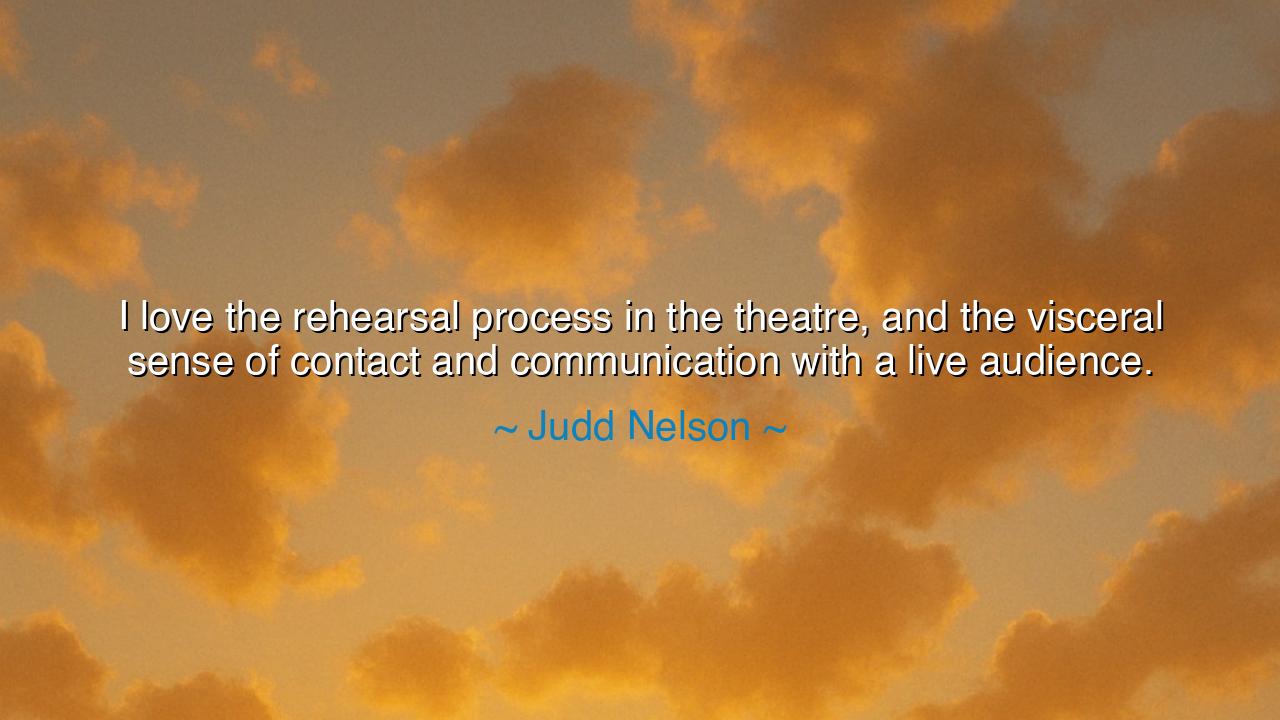
I love the rehearsal process in the theatre, and the visceral
I love the rehearsal process in the theatre, and the visceral sense of contact and communication with a live audience.






Host: The soft hum of the café enveloped them as the evening wore on, the sky outside shifting into shades of dusk. The city outside seemed to slow down, the streets becoming quieter, but inside, the conversation between Jack and Jeeny remained warm and alive. Jeeny, always eager to dive into deeper meanings, spoke up, her voice thoughtful but full of curiosity.
Jeeny: “I came across something Judd Nelson said recently, and it really got me thinking. He said, ‘I love the rehearsal process in the theatre, and the visceral sense of contact and communication with a live audience.’” She looked at Jack, her expression both interested and intrigued. “What do you think? Do you think there’s something special about that live, in-the-moment connection with an audience? What makes it so different from other forms of performance?”
Jack: He leaned back, his fingers drumming lightly on the edge of his coffee cup as he thought about her question. “I think there’s a rawness to theatre that no other form of performance has. It’s the unpredictability of it—the live connection between the performers and the audience that makes it unique. When you’re on stage, you’re engaging with people in real-time. You can feel their reactions, their energy, and it directly affects the performance. It’s not just about the lines or the characters; it’s about the exchange, the feeling in the room. And in that way, the performance becomes alive in a way that a movie or TV show never could.”
Host: The light from the window outside began to dim as the night deepened, but the warmth in the café seemed to grow as the conversation developed. Jeeny’s gaze remained steady on Jack, her voice thoughtful as she dove deeper into the idea.
Jeeny: “Exactly. The live, immediate nature of theatre creates a level of intimacy that’s hard to replicate in other mediums. When you're performing live, you're forced to be present in a way that demands a level of vulnerability. There's no second take, no editing. The connection is built on raw, unfiltered emotion, both from the performer and the audience. It’s that energy exchange that gives theatre its power.” She paused, her smile softening. “Maybe that’s why it’s so special. It’s not controlled. It’s alive, ever-changing, based on the people in the room.”
Jack: “Yeah, and that’s what makes it so exciting and so unpredictable,” he said, his voice growing a bit more animated now. “Each night is different. The audience’s energy changes the way you deliver your lines, the way you move. It’s a living thing, this dialogue between performer and spectator. I think that’s why actors talk about it so passionately—there’s something so powerful about being part of that moment, that connection. It’s not like a film where you can hide behind edits or a camera angle. It’s real-time—no hiding, no tricks, just pure, unfiltered interaction.”
Jeeny: “And it’s not just about the audience, either,” she added, her voice soft but insistent. “It’s also about the actors themselves. The rehearsal process—the way you build a character and refine it over time. The exploration of emotions, of the character’s journey, with the knowledge that the final performance will always be a bit different because of that interaction. It's like crafting something tangible, something that changes as it grows. You can’t fully anticipate the magic of a live performance until you’re in the middle of it.” She smiled, a contented expression on her face. “I think that’s what Judd Nelson is referring to when he talks about the visceral sense of contact. It’s the alchemy of all those elements coming together.”
Host: The mood in the café shifted, the words hanging in the air as they both reflected on the energy of live performance—the excitement, the unpredictability, and the vulnerability that it demanded. The world outside was still and quiet now, but inside, the conversation seemed to fill the space, creating a sense of shared understanding.
Jack: “I think I get it now. There’s something raw about live performance that makes it so powerful. It’s not just about getting the lines right, or delivering a perfect performance. It’s about being open to the moment, to the connection with the audience, to the emotion that is so tangible and real in the room. It’s not just a show—it’s a living experience.” He paused, his voice growing quieter, more reflective. “Maybe that’s why people love theatre so much. Because it reminds them that the present moment is fleeting, and it’s the only time we truly have.”
Jeeny: “Exactly,” she said softly, a smile forming at the corners of her lips. “That’s why theatre is so special—it forces you to be in the moment, to create something from the connection and the energy in the room. It’s alive, it’s unpredictable, and it makes the audience a part of the experience. That’s what makes it so powerful.”
Host: The soft hum of the café filled the air as Jack and Jeeny sat in the quiet understanding that had grown between them. Perhaps, in the end, the true power of theatre wasn’t in the performance itself, but in the connection it creates—between actors, between the audience, and between the moment that unfolds in real-time. Theatre, as they both realized, wasn’t just about telling a story—it was about living it, together.






AAdministratorAdministrator
Welcome, honored guests. Please leave a comment, we will respond soon